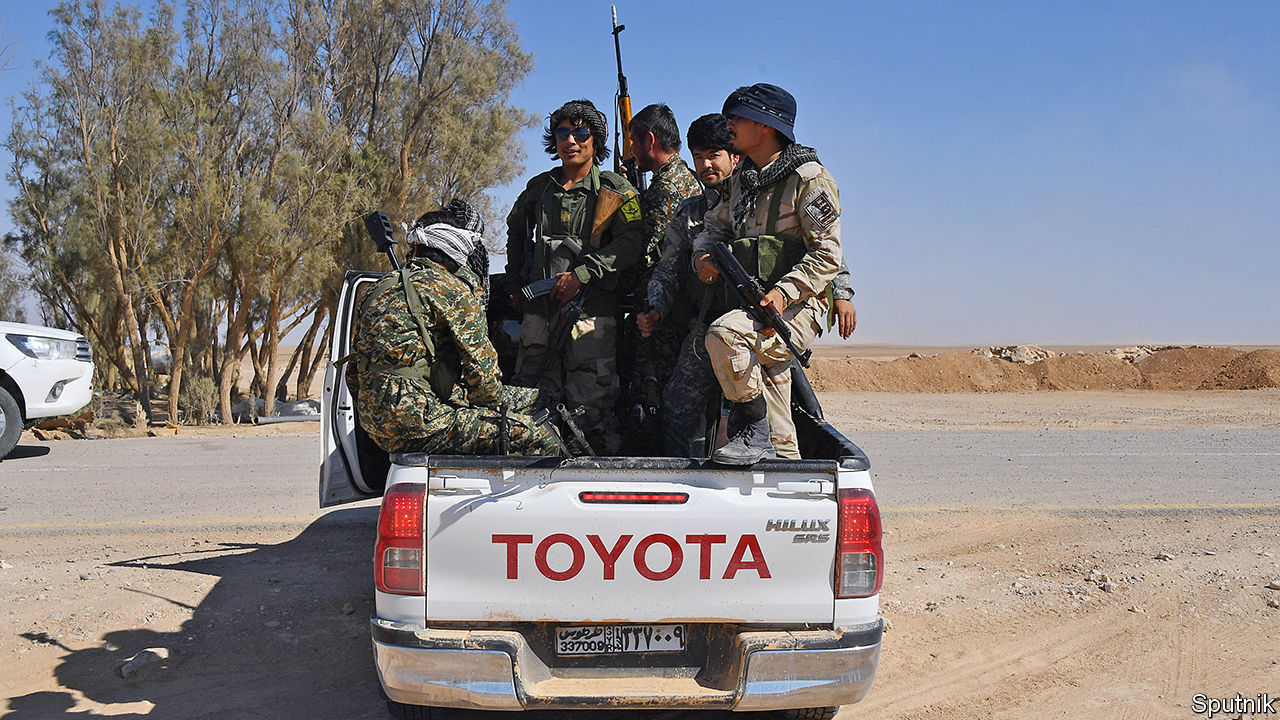 Alireza qanbari has still not told his parents the truth about what he did when he left Afghanistan for Iran. The 23-year-old is happy for his father to believe he worked as a labourer. In fact, he fought with an Afghan militia recruited by Iran to help prop up the government in Syria’s civil war. With the war now dying down, Afghan fighters are starting to come home. Just as the West agonises about the return of radicalised émigrés, many in Afghanistan worry about what the former fighters will do—and where their loyalties lie.
Alireza qanbari has still not told his parents the truth about what he did when he left Afghanistan for Iran. The 23-year-old is happy for his father to believe he worked as a labourer. In fact, he fought with an Afghan militia recruited by Iran to help prop up the government in Syria’s civil war. With the war now dying down, Afghan fighters are starting to come home. Just as the West agonises about the return of radicalised émigrés, many in Afghanistan worry about what the former fighters will do—and where their loyalties lie.
At its height, the Fatemiyoun, as the Afghan militia was known, had as many as 20,000 fighters, largely from the Hazara ethnic minority. Most Hazaras are Shia Muslims, as are the ruling elite in both Iran and Syria. Long downtrodden, Hazaras were especially persecuted by the Sunni Muslims of the Taliban. More recently the Afghan branch of Islamic State has launched terror attacks on Hazara targets.
Get our daily newsletter
Mr Qanbari, which is not his real name, was desperate to escape stifling poverty in the countryside near Herat, close to Afghanistan’s border with Iran. So, like many of his peers, he crossed the frontier to find work. A Hazara friend of his in Iran disappeared, only to resurface nine months later in a military hospital. His friend revealed he had been wounded in Syria with the Fatemiyoun, which paid three times a labourer’s wage. Moreover, Iran was handing out prized residency permits to those who fought—a powerful incentive given that around 250,000 Afghans who lack the right papers are deported from Iran each year.
There were also historical reasons for the birth of the Fatemiyoun. Many Afghans had fought for their neighbour during the Iran-Iraq War, and ties between those veterans and the Iranian security apparatus endured. The founder of the Fatemiyoun, Alireza Tavasoli, was one such veteran.
While most recruits joined the Fatemiyoun for the money, they also received religious indoctrination, Mr Qanbari and others say. Young recruits were told they would be defending Shia shrines against Islamic State. After scant training, they were sent into some of the war’s worst fighting and suffered terrible casualties.
Although most Fatemiyoun veterans are thought to have remained in Iran, many have returned to Afghanistan. That is causing unease. During the most chaotic phase of Afghanistan’s civil war, in the 1990s, Iran backed militias as proxies, just as Pakistan backed the Taliban. The Fatemiyoun may play such a role in the future, Afghan intelligence officials fear. “It is a concern that when the national interests of the country that trained them are in danger, these people will go back and even act against our national interests,” says Sayed Azim Kabarzani, an mpfrom Herat. Fatemiyoun veterans say they feel they are under scrutiny by the authorities. They are reluctant to talk to journalists.
Yet Iran would struggle to mobilise the Fatemiyoun inside Afghanistan, says Said Reza Kazemi, an academic. There would also be great resistance among Afghan Shias to any sort of mobilisation against the Afghan state. Hazaras have benefited from the current political order and have no desire to turn against it. A more likely prospect, says Ahmad Shuja, who has interviewed dozens of Hazara leaders and veterans for a report for the United States Institute of Peace, is that if security in the Hazara areas worsens and residents feel abandoned, veterans will form self-defence forces. When Taliban fighters overran previously safe Hazara areas in central Afghanistan last year, Fatemiyoun veterans tried to hold them off, but were not well organised, intelligence officials say.
Mr Qanbari carries many scars from his years at the front. His mental health has suffered and he is prone to seizures. But he is also unemployed and short of money. With Iran having declared victory in Syria, the future of the Fatemiyoun is uncertain. In January America blacklisted it for its ties to Iran’s Revolutionary Guards. But Mr Qanbari wonders if his best hope is to return to Iran and start lying to his parents again.
No comments:
Post a Comment